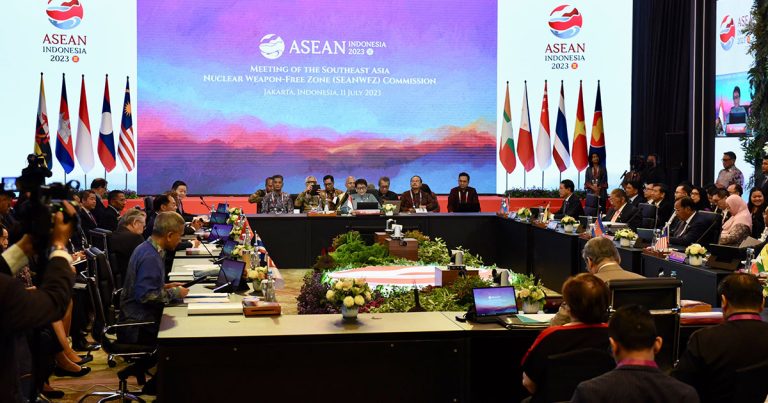14-7-2023 (JAKARTA) Foreign ministers from the Association of Southeast Asian Nations (ASEAN) have reiterated their commitment to the Five-Point Consensus as the primary framework to address the ongoing political crisis in Myanmar. They have strongly condemned the persistent acts of violence, including air strikes, artillery shelling, and the destruction of public infrastructure.
The top diplomats of ASEAN member states have gathered in Jakarta this week for the annual foreign ministers and related meetings, hosted by Indonesia as the current chair of the regional group. In a joint communique issued on Thursday, the ministers called on all parties involved to take concrete action to immediately cease indiscriminate violence, denounce any escalation, and create an environment conducive to humanitarian assistance and inclusive national dialogue. They emphasized the need for a peaceful resolution to the crisis, respecting the democratically elected government of Aung San Suu Kyi.
On the sidelines of the meetings, Thailand’s Foreign Minister Don Pramudwinai revealed that he had met with Aung San Suu Kyi on Sunday, marking her first known meeting with a foreign envoy since her detention. In June, Thailand held an informal meeting with Myanmar’s military, which was not attended by most ASEAN members, including current chair Indonesia.
The joint communique also mentioned that Thailand provided a briefing to the ASEAN foreign ministers on its recent activities related to Myanmar, which several member states regarded as a positive development. However, the communique did not provide further details about these activities but reaffirmed ASEAN unity and the importance of supporting efforts in line with the Five-Point Consensus and in coordination with the ASEAN chair.
South China Sea Dispute Discussed
The meetings also addressed the South China Sea dispute. The ministers expressed concerns about land reclamations, incidents jeopardizing safety, and damage to the marine environment in the area. They noted that these actions have eroded trust, increased tensions, and may undermine peace, security, and stability in the region. The ministers reaffirmed the significance of maintaining peace, security, stability, safety, and freedom of navigation in the South China Sea, recognizing the benefits of a peaceful and prosperous sea.
Earlier on Thursday, ASEAN’s foreign ministers met with China’s top diplomat, Wang Yi, and agreed on guidelines to expedite the negotiation of a code of conduct for the South China Sea. China asserts territorial claims over a large portion of the South China Sea, while ASEAN members Brunei, Malaysia, the Philippines, and Vietnam are also claimants.
ASEAN countries, along with the United States, have long contested China’s territorial claims and sought to negotiate a code of conduct to resolve disputes in the region. However, progress has been hindered by various factors, including the recent COVID-19 pandemic, which has made it challenging to hold in-person meetings.
The ministers emphasized the importance of maintaining an environment conducive to code of conduct negotiations and welcomed practical measures aimed at reducing tensions, as well as the risk of accidents, misunderstandings, and miscalculations.




